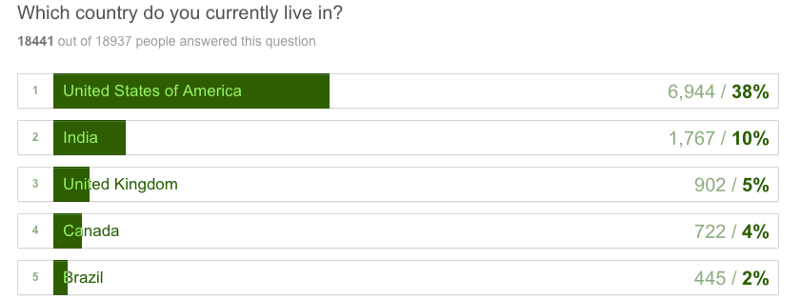Who you are? How did you learn to program? What are you striving for? 20,000 responses
So-so-so, just a minute attention!
Today, everyone who is involved in information technology, Internet design and working with digital data celebrates their professional holiday. Therefore, all of the holiday!

The freeCodeCamp project conducted a survey of 2017 New Coder Survey, which was attended by more than 20,000 people from around the world. This data, containing the respondents' answers to about 50 questions, is publicly available on the GitHub (Open Data Common License).
The collected results allow researchers who deal with computer education among adults to learn a lot of interesting things. We believe that these data will interest many, we can only guess what discoveries will be made on the basis of their analysis.
Now we bring to your attention a general overview of the survey results, which allows us to understand several basic things. First - to find out who they are, novice programmers. Secondly - to understand - exactly how they study. Third, see their goals.
Members
As already mentioned, more than 20,000 novice programmers took part in the survey. These include people who have been programming for less than 5 years. Here is some information about them:
')
- 62% of respondents live outside the United States.
- Their average age is 28 years.
- 19% of them are women.
- On average, they are programming 21 months.
- 25% of them have already found their first job as a programmer.
Wishes of survey participants
40% of participants would like to either engage in freelancing, or organize their own company.

Most would like to work as a web developer, however, in general, the respondents are interested in a rather wide range of specializations.


Among those survey participants who are not yet working as programmers, 63% plan to begin searching for work in this area in the next 12 months.

50% would like to work in an office, as opposed to remote work, which is less than 57% last year.

The vast majority, for the sake of new work, are ready to move.

Programming training
Most novice programmers declare the use of various educational online resources.


However, less than half personally participated in traditional programming activities.


Most novice programmers have never listened to specialized podcasts, but among those programmers who listen to podcasts, many similar resources have gained popularity.


Three out of four respondents watch a programming video on YouTube.


About 6% of novice programmers underwent intensive training, while among the respondents there are those who successfully graduated from one of more than 148 similar programs.


Most participate in such trainings for their money, some take a loan to study.

Most of the training participants were satisfied with them, they can recommend them to friends.

Demographics, social and economic factors
Women among novice programmers, as before, a little.

The average age of respondents is 28 years.

In some countries, people start programming later than in others.

The survey included respondents from 187 countries.


Most of them live in large cities.

About a quarter identify themselves as ethnic minorities in their country.

For the majority, English is a foreign language, but in general, the survey includes people whose native is one of 175 languages.


54% of novice programmers already have a bachelor's degree or higher.

Among the more than 485 areas in which respondents were trained, the majority are not related to information technology.


Two thirds of the respondents to the questions, at the time of participation in the study, had any work.

The work of about half of them is related to information technology.


38% of workers spend at least an hour every day to get to work and return home.

Two of the three novice programmers are not married.

8% of respondents served in the military.

15% have children, and 6% support elderly relatives or relatives with disabilities.

44% believe that they are doing work that does not match their qualifications and level of education.

23% have student loan debt.

11% have a mortgage loan.

15% do not have home high-speed Internet.
3% receive state benefits.
Results
"Who is he, a novice programmer?". We believe that a review of the survey results allows us to find some answer to this question: an unmarried man of twenty-eight years old who lives in a big city and spends an hour traveling to work that does not meet his qualifications. “How do programmers learn?”, Listen to podcasts, watch videos on YouTube, participate in trainings. “What do they want?”, - freelancing or own business.
Of course, these conclusions can and should be clarified by providing the results of the analysis of survey data. That's why we, as already mentioned, posted the materials in open access in the repository on GitHub . There are files with the original data, as well as cleared and normalized survey results.
If you are an analyst, it is possible that you will be interested in working with these materials. It is possible that you will find us something absolutely amazing. And if you are a novice programmer, it’s quite possible that you, having learned how others learn to program, will be able to improve your computer education strategy.
Dear readers! Please tell us how you learned to program? How do you keep your knowledge and skills up to date?
Source: https://habr.com/ru/post/328886/
All Articles